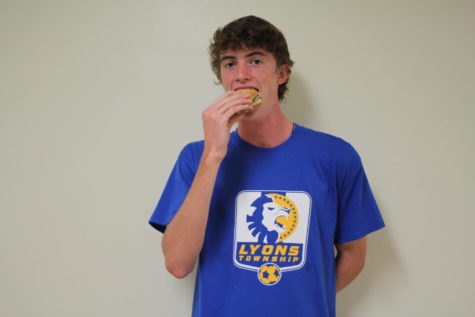COVID-19 disrupts college recruitment
Virus affects Lindsay Hahn, Eleanor McMeen, Jackson Turner pursuit of college sports
October 7, 2020
Since beginning her competitive basketball career in third grade, Lindsay Hahn ‘21 has always sought to compete at the next level, she said. For a while, that meant playing on varsity; however, that goal quickly changed after making the squad her freshman year.
She has since spent the past few years communicating with college coaches and visiting campuses in the pursuit of playing college basketball, she said. Although she recently committed to Division II college Winona State, her recruitment was greatly affected by the black hole COVID-19 created between student athletes and coaches.
“Finally having committed to a college where I know I’ll get the best of both worlds between academics and sports feels like a huge weight has been lifted off my shoulders,” Hahn said. “It’s already such a stressful situation trying to figure out college, especially with sports. To have to go through a pandemic with limited contact with coaches makes it more exhausting.”
The restrictions were established beginning in March and have affected each division of NCAA, but Division II and Division III schools have been a bit more lenient when it comes to making contact with athletes, head girls varsity coach Meghan Hutchens said.
Regardless of the division, coaches have been unable to meet in person with student athletes and had to rely on game film, which does not necessarily demonstrate leadership characteristics, Hahn said.
With the added difficulties, LT varsity coaches remain committed to helping guide aspiring college athletes towards their goal, Hutchens said.
“Colleges and college coaches are in a tough situation because there is no right answer,” Hutchens said. “Our coaching staff will continue to share game footage and reach out to colleges, and hopefully college coaches will continue to use us as resources.”
Similarly to Hahn, All-American girls swimmer Eleanor McMeen’s ‘21 recruitment process was completely changed by COVID-19, she said. McMeen, who is on the record board for multiple events, was set to make official campus tours in the spring before public health concerns forced cancellations. She credits the extra time as a factor which allowed her to explore other schools—ultimately leading her to choose Tulane, a decision she is very excited about, McMeen said.
“I tried to never stress about the uncertainty of the future with recruiting, but I did worry about it a little,” McMeen said. “I had to remind myself that everyone else was in the same position as me.”
For many student-athletes, COVID-19’s untimeliness and disruption has not allowed for decisions to be finalized over recruitment. Jackson Turner ‘21, a three-year starter on the boys varsity soccer team, was preparing for the most important soccer tournament he would have participated in—a college showcase for club team FC United Academy—when COVID-19 hit, Turner said. Without that tournament and the majority of his spring season, it made it impossible for coaches to watch him play, halting any potential recruitment.
“It still frustrates me to this day because I think my college application process would be a lot different right now had COVID-19 not been here,” he said. “Now, I may or may not play soccer in college because I haven’t been recruited by as many schools as I would’ve hoped.”
Turner will continue to contact colleges and send in film in the upcoming months in pursuit of playing collegiately, he said. The Illinois High School Association will allow the boys soccer season to begin in February.



















![Movie poster for '[Rec]" (2007).](https://www.lionnewspaper.com/wp-content/uploads/2023/04/rec-640x900.jpg)


